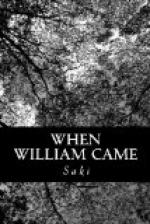The dancing of the faun took one day a livelier and more assured turn, the joyousness became more real, and the worst of the vicissitudes seemed suddenly over. A musical friend, gifted with mediocre but marketable abilities, supplied Tony with a song, for which he obtained a trial performance at an East End hall. Dressed as a jockey, for no particular reason except that the costume suited him, he sang, “They quaff the gay bubbly in Eccleston Square” to an appreciative audience, which included the manager of a famous West End theatre of varieties. Tony and his song won the managerial favour, and were immediately transplanted to the West End house, where they scored a success of which the drooping music-hall industry was at the moment badly in need.
It was just after the great catastrophe, and men of the London world were in no humour to think; they had witnessed the inconceivable befall them, they had nothing but political ruin to stare at, and they were anxious to look the other way. The words of Tony’s song were more or less meaningless, though he sang them remarkably well, but the tune, with its air of slyness and furtive joyousness, appealed in some unaccountable manner to people who were furtively unhappy, and who were trying to appear stoically cheerful.
“What must be, must be,” and “It’s a poor heart that never rejoices,” were the popular expressions of the London public at that moment, and the men who had to cater for that public were thankful when they were able to stumble across anything that fitted in with the prevailing mood. For the first time in his life Tony Luton discovered that agents and managers were a leisured class, and that office boys had manners.
He entered Cicely’s drawing-room with the air of one to whom assurance of manner has become a sheathed weapon, a court accessory rather than a trade implement. He was more quietly dressed than the usual run of music-hall successes; he had looked critically at life from too many angles not to know that though clothes cannot make a man they can certainly damn him.
“Thank you, I have lunched already,” he said in answer to a question from Cicely. “Thank you,” he said again in a cheerful affirmative, as the question of hock in a tall ice-cold goblet was propounded to him.
“I’ve come to tell you the latest about the Gorla Mustelford evening,” he continued. “Old Laurent is putting his back into it, and it’s really going to be rather a big affair. She’s going to out-Russian the Russians. Of course, she hasn’t their technique nor a tenth of their training, but she’s having tons of advertisement. The name Gorla is almost an advertisement in itself, and then there’s the fact that she’s the daughter of a peer.”
“She has temperament,” said Cicely, with the decision of one who makes a vague statement in a good cause.
“So Laurent says,” observed Tony. “He discovers temperament in every one that he intends to boom. He told me that I had temperament to the finger-tips, and I was too polite to contradict him. But I haven’t told you the really important thing about the Mustelford debut. It is a profound secret, more or less, so you must promise not to breathe a word about it till half-past four, when it will appear in all the six o’clock newspapers.”




